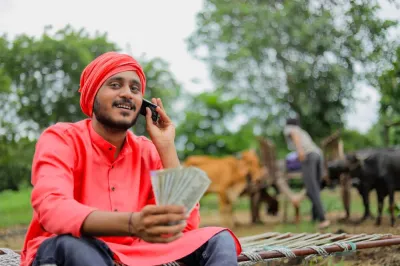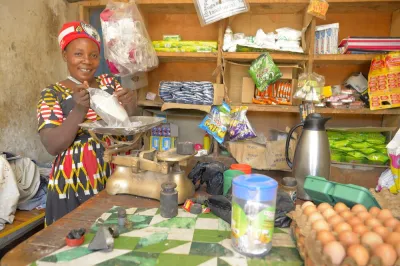COVID-19 FinDev Weekly Update | 11-17 June 2020
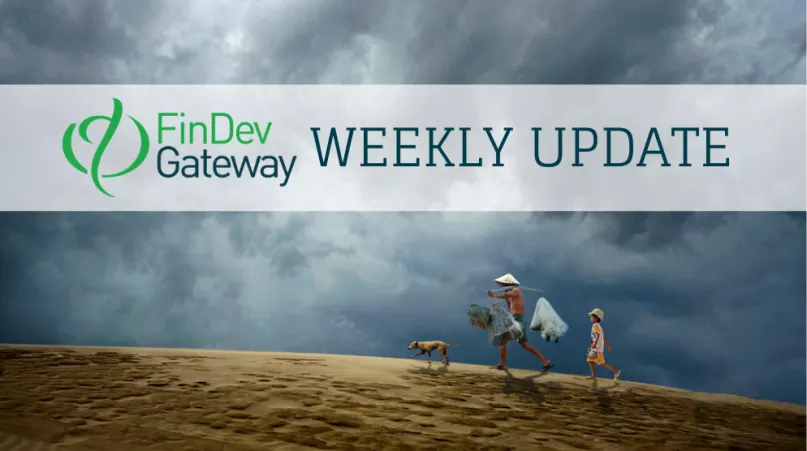
FinDev Gateway has created this COVID-19 weekly update with the latest and most relevant knowledge resources for financial inclusion as they become available. Sign up to receive FinDev's weekly update each Friday with a summary of the main issues covered during the week.
If you have content to share in our weekly update, please submit here or contact us directly.
Do you find the update useful? How often would you like to receive it? Take a moment to let us know >>
Global Summary
- As data from various surveys starts to come in, organizations share what they are learning. Although limited in different ways, surveys are providing important insights on the impact of COVID-19 on microfinance providers and their clients.
- First results from the CGAP Global Pulse Survey of MFIs - which includes responses from 180 MFIs - suggest that MFI liquidity may not be an urgent concern - at least not as of the end of April 2020 - and the increase in the global portfolio at risk over 30 days is less than many have feared. A CGAP framework helps regulators and policy makers respond to COVID-19 impacts on the microfinance sector.
- Another, much smaller survey by the Women’s World Banking finds that 12 surveyed FSPs in 10 countries are experiencing high default rates in loan repayments; the same FSPs have seen 67 percent fewer loan applications from MSMEs.
- BFA Global shares insights from its rapid survey of over 1,800 low-income people in nine countries where loan delinquencies are rising as incomes decrease and expenses go up; surveyed shopkeepers in Mexico expect a spike in purchases on store credit. A stress testing model developed by BFA will help savings and credit cooperatives better prepare to deal with the COVID-19 crisis.
-
In an interim report, IFAD’s Remittance Community Task Force specifies key measures that public and private sectors can take to facilitate remittance flows during the COVID-19 crisis.
-
The World Bank warns of decline in education financing as governments, donors, and households shift spending to health and social protection.
Asia
- In Nepal, remittances dropped nearly 50 percent in the last two months, as compared to the same period last year; this is likely to have dire consequences for the nation, whose economy is one of the world’s most dependent on remittances, which contributed 27.3 percent to country’s GDP last year. The World Economic Forum’s Regional Action Group for South Asia is supporting a multi-stakeholder working group to devise recommendations to manage the fallout from the remittance crisis.
- Bangladesh is also experiencing a decline in remittances, but so far the government’s response has been supportive, offering incentives to remittance senders and beneficiaries.
- The Indian think tank Observer Research Foundation predicts that COVID-19 could be the "demonetization moment" for digital financial services in India.
- In Thailand, government benefits for workers affected by COVID-19 apply to both Thais and foreigners, but the requirements to receive the aid (a Thai bank account and at least six months of contributing to the government fund) would exclude millions of vulnerable migrant workers.
Africa
Some articles and knowledge resources referenced in this section are in French.
- The Association of Microfinance Institutions in Rwanda (AMIR), which represents over 390 members serving more than three million clients, has helped MFIs implement measures to protect microfinance clients from the virus spread.
- The pandemic and the hyperinflation in Zimbabwe has sent more people into poverty, including informal workers and street vendors.
- The French National Assembly is discussing a tax exemption proposal for remittances sent from the diaspora in France to Africa, with the aim of encouraging money transfers to the region.
- According to Kenya’s Insurance Regulatory Authority, insurance companies in the country have paid the equivalent of $1 million to cover COVID-19 related disasters.
- In Tanzania, women members of vicoba groups (village community banks) struggle to repay loans and contribute toward group savings.
- In Senegal, according to a survey by ADEPME, an SME development agency, 90 percent of SMEs have been affected by COVID-19.
- In Gabon, Airtel Money and the Sylvia Bongo Ondimba Foundation for the Family have partnered to use mobile money to send aid to over 6,000 low-income families.
- Meanwhile, in Gambia, UNCDF has launched a crowdfunding platform to support young entrepreneurs.
- Benin has also launched a relief package of $127 million to help small businesses and the informal sector.
For more on Africa, check out the latest Portail FinDev Weekly Update in French.
Latin America and the Caribbean
Most articles and knowledge resources referenced in this section are in Spanish.
- ECLAC and FAO have recommended an anti-hunger grant to prevent hunger in the region.
- In Brazil, Facebook launched WhatsApp digital payments, which will allow users to send and receive money without leaving the platform.
- A decree in Nicaragua will allow MFIs to restructure debts of clients who cannot repay loans.
- The Central Bank of Mexico warned of liquidity problems among many of the non-bank financial institutions which serve almost 12 million low-income clients.
- Nearly 700 people tuned in to a webinar organized by Portal FinDev and the regional MFI network REDCAMIF in which directors of seven MFI country networks discussed the impact of COVID-19 on their clients and operations, as well as appropriate measures taken by MFIs to survive the crisis. MFIs are taking steps to monitor clients’ health, restructure client debt as needed, accelerate digital transformation, and regularly communicate with donors and investors to prevent liquidity issues.
For more on LAC, check out the latest Portal FinDev Weekly Update in Spanish.
Arab World
- A government-to-person (G2P) digital payment solution enabled more than 1,500 rural Tunisian women to access social security assistance; over 23,000 registered female users were also able to establish links with associations and citizens to receive food supplies from the nearest point of sale at no cost.
- The World Bank approved $400 million to support Egypt’s Universal Health Insurance System.
- The Mediterranean Host Municipalities Learning Network and the World Bank are organizing a series of online technical training sessions to help municipal authorities better serve refugees and other vulnerable local populations through work and entrepreneurship opportunities and private sector partnerships.
For more on the Arab world and resources in Arabic, check out the latest FinDev Weekly Update in Arabic.
COVID-19 Resources
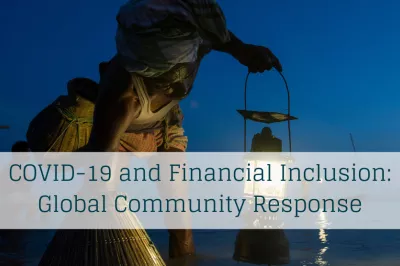
Global Community Response to COVID-19
A list of organizations offering resources and insights on COVID-19 & microfinance
FinDev Coronavirus Data Tracker
Data relevant for financial inclusion - find out who is tracking what
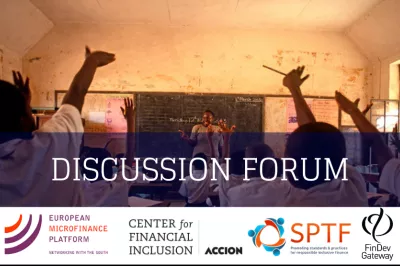
Recent Publications
For a complete list of publications and to learn how you can share your research with us, visit FinDev's Publications page.
Microfinance and COVID-19: A Framework for Regulatory Response
CGAP | Jun 2020
This brief presents a framework for identifying and assessing crisis responses as well as recommends a dialogue between policy makers and sector representatives such as microfinance associations in crafting responses to the crisis.
COVID-19 and the Future of Microfinance: Evidence and Insights from Pakistan
Financial Access Initiative | Jun 2020
The study reports results from "rapid response" phone surveys of about 1,000 microenterprise owners, a survey of about 200 microfinance loan officers, and interviews with regulators and senior representatives of microfinance institutions.
Improving Agricultural Interventions Under the New National Target Programs in Vietnam
World Bank | Jun 2020
The main objective of this analytical work is to recommend improvements to some of the agricultural interventions under the new National Target Programs in Vietnam.
The Impact of Nonperforming Loans on Cross-Border Bank Lending: Implications for Emerging Market Economies
Asian Development Bank | Jun 2020
This brief suggests how policy makers can tackle the likely rise in nonperforming loans as a result of the COVID-19 pandemic to prevent a debt crisis.
The Impact of the COVID-19 Pandemic on Education Financing
World Bank | May 2020
This brief summarizes evidence on the negative impact that the pandemic is likely to have on education financing and identifies some policy responses to mitigate this impact.
View All Publications Related to COVID-19 >
Blogs & Opinion
If you have a blog idea and would like to write for the FinDev Blog, please see our review our guidelines. We do not cross-post blogs that have been published elsewhere, but if you wish to share an existing blog post in our next FinDev Weekly Update, you can send it to us using our contact form.
Microfinance Institutions
Survey Shows Gathering Clouds, but No Storm (Yet) for Microfinance
18 Jun 2020 | Peter Zetterli & Alexander Sotiriou | CGAP
Stress Testing in Crisis: Helping Savings and Credit Cooperatives in Mexico During COVID-19
16 Jun 2020 | Gabriela Zapata, Jacob Winiecki & Jorge Hernandez | CFI-Accion
Covid-19, Low Income Finance and Nine Takeaways from a Quick Survey
15 Jun 2020 | Mehrdad (Mehi) Mirpouria | Women’s World Banking
Thoughts on How Financial Service Providers Can Respond to the COVID-19 Pandemic Crisis
09 Jun 2020 | Robert Christen | Boulder Institute of Microfinance
Scenario Planning Can Help Mexican Financial Cooperatives Prepare for COVID-19 Impact
09 Jun 2020 | Leticia Jáuregui & Gabriela Zapata | BFA Global
Housing Finance
Better Homes Support Public Health
16 Jun 2020 | Vidhee Garg & Olivia Nielsen | FinDev Gateway
Focus on Clients
Snapshot of Financial Health During Peak COVID-19
17 Jun 2020 | Ashirul Amin | BFA Global
Pulse Surveys With Shopkeepers Across Mexico During COVID-19
15 Jun 2020 | Ben Mazzotta & Sebastian Barrera | BFA Global
Corona Case Studies: ‘Waiting for Nothing’
12 Jun 2020 | Julie Zollmann, Anne Gachoka & Hildah Chao | FSD Kenya
Corona Case Studies: ‘Running Out of Options’
12 Jun 2020 | Julie Zollmann & Anne Gachoka | FSD Kenya
Designing for Women: How COVID-19 Could Allow Government Payment Programs to Boost Women’s Economic Empowerment
11 Jun 2020 | Amanda Schwartz | NextBillion
Survive to Thrive
11 Jun 2020 | Larry Reed | Soul of Finance
Remittances
Nepal Faces a Crisis as COVID-19 Stems the Flow of Remittances
16 Jun 2020 | Ali Akram & Andrew Caruana Galizia | World Economic Forum
Bangladesh Faces a Crisis in Remittances Amid COVID-19
16 Jun 2020 | Amil Aneja & Sheikh Tanjeb Islam | World Economic Forum
Digital Transformation
India’s Digital Financial Services Opportunity In A Post-Covid World
15 Jun 2020 | Melissa Frakman | Observer Research Foundation
COVID-19 Response: Lessons From Digital Platforms, BigTechs
12 Jun 2020 | Ghiyazuddin Mohammad & Adeyemi Omotoso | AFI
Smallholder Finance
A New Test for Old Technology: How COVID-19 is Sparking Innovation in PayGo Financing for Biodigesters
17 Jun 2020 | Laura Harwig | NextBillion
News
For the latest news on the impact of coronavirus on financial inclusion, visit our News listing pages.
Nampost Gets Concessional Loan of N$235 Million to Microfinance Pensioner Services
| Namibia Economist | Namibia
Nepal: Strategies for Post-COVID-19 Recovery Amidst Falling Remittances
| The Himalayan Times | Nepal
IFC’s $50 Million In Support to Commercial Bank of Ceylon to Boost Finance for Small Businesses in Sri Lanka Amid COVID-19
| International Finance Corporation (IFC) | Sri Lanka
View All News Related to COVID-19 >
Webinars
For the latest events - hosted by organizations worldwide - exploring the impact of coronavirus on financial inclusion, visit our Events listing page.
Research Methods to Identify COVID-Related Financial Crimes
30 Jun 2020 | Innovations for Poverty Action
Microfinance and COVID-19 in Pakistan: What Happens After Lockdown?
08 Jul 2020 | FinDev Gateway, Innovations for Poverty Action
Quick Links:
FinDev Guide
About this guide
Published
Topics
Contributed by a global financial inclusion community member. Share your lessons learned
Write for usLeave a Comment
Comments on this page are moderated by FinDev Editors. We welcome comments that offer remarks and insights that are relevant to the post. Learn More
